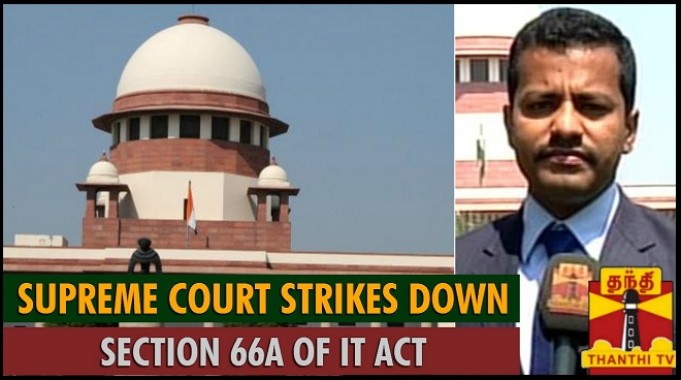Perils of absolute freedom
The Supreme Court struck down Section 66A of the IT Act but the challenge of protecting free speech provisions from misuse remains
Hearing Arun Jaitley telling Arvind Kejriwal to be temperate with his language in his tweets reminds me of a funny advertisement on TV.
The driver of a car looking for parking space forces an unwilling boy to check his bumper while he is backing. The boy guides him to move back till his car hits a tree and then he runs away saying “Ab lag gayee.”
I mean, it took the Information Minister of the country so long to realise that the language being used on social media has crossed all limits of decency and decorum because today Narendra Modi is on the receiving end.
Now he joins the ranks of Rahul Gandhi, Shashi Tharoor, Kiran Bedi, Rajdeep Sardesai, Digvijaya Singh and numerous others who have been facing the wrath of the Modi Bhakts. Some decent people like Ravish Kumar left Facebook because they could not bear this onslaught of obscenity and abuse. The torrent of abuse is particularly abusive between the followers of the Aam Aadmi Party and the saffron party.
I also joined this august company recently when at the peak of the heated demand for lowering the age of juveniles I wrote what I thought was a balanced story, ‘A tale of two mothers’ pointing out that the family of the juvenile living in Badaun was equally devastated as he was the eldest of five siblings who had left his town in search of employment nine years back. This prompted numerous hate mails, one of which said “Marry your daughter to him.”
The year 2015 would have gone down as a notable year for votaries of free speech and expression because on May 25, the Supreme Court quashed the draconian Article 66 A of the Information Technology Act (2000) which had been invoked during the time of UPA II to arrest even children for posting comments on social media.
The most famous of the victims were two girls in Mumbai who questioned the justification for a Mumbai bandh on the day Bal Thackerey was cremated. In West Bengal, a professor was arrested for sharing cartoons on Mamata Banerjee and another man was arrested for commenting on the son of P. Chidambaram. Finally, when a Class 11 student in Uttar Pradesh was arrested for posting objectionable comments apparently attributed to Azam Khan, NGOs and other activists went to the Supreme Court.
Putting an end to such misuse of the Act, the Supreme Court in Shreya Singhal vs.Union of India through a landmark judgment comprising a Bench of Justice R.F. Nariman and Justice J. Chelameswar, declared that Section 66A was not only vague and arbitrary, but that it also “disproportionately invades the right of free speech.”
Former attorney general Soli J. Sorabjee, who appeared for one of the petitioners, termed the judgment a 'glorious vindication' of right to free speech.
However every freedom comes at a price.
The freedom from persecution on the social sites soon changed into a freedom to insult and abuse and by the end of the year people have started wondering whether this was a big blunder.
The first warning of this came from Pawan Duggal, a leading lawyer and cyber expert who said in a talk at Prayas Hairsplitters Forum that the removal of the Act had set off a trend of ‘cyber bullying’ on social media. The above mentioned celebrities are only a few names that have suffered this onslaught.
Recently a new, more sinister, dimension of the freedom of social media was exhibited by the Home Ministry. The Minister of State for Home, Haribhai Chaudhary, informed the Rajya Sabha that terrorist organisations like Islamic State (IS) and Lashkar-e-Tayyeba (LeT) were active in cyber space and social media and as many as 23 Indians had joined the ranks of IS while 60 others were prevented from joining by the IB.
Both these developments lead one to believe that it is time to have a rethink on how to strike a balance between Article 19(1) (a) guaranteeing freedom of speech and expression and Article 19 (2) which limits this right in allowing the state the power to impose reasonable restrictions in the interest of the sovereignty and integrity of India, the security of the state, public order, decency or morality, defamation, or incitement to an offence.
The Supreme Court in its judgment also clarified that there was a huge difference between speech on internet and other mediums of communication and held that the Government was justified in having separate laws to deal with offensive speech on the internet.
The Bench stated that the internet had an international audience where every individual could air his/her views and given that it did not exist and operate in an institutional form, there was a need for some mechanism to put checks and balances on this medium.
Secondly, the fact remains that even though Section 66A was repealed, social media users should be cautioned that abusive, absurd, provocative messages through social media sites may still be penalised under various offences and attract the penal provisions of Indian Penal Code such as Section 500 (defamation), Section 505 (public mischief causing fear to the public by sending or making any rumours, reports or statements ), Section 506 (criminal intimidation causing threats to injure person, imputing unchastity to a woman), Section 509 (insulting the modesty of woman or intruding privacy), Section 507 (criminal intimidation by anonymous communication), Section 124A (sedition) and Section 295A (blasphemy - statements that insult religious beliefs).
Absolute freedom of speech or freedom of press is a utopian state which is not available even in countries that are so-called votaries of human rights and champions of press freedom. This freedom has been tampered with by the laws that keep the security of the state as the primary criterion because there can be no greater freedom than the right to life.







